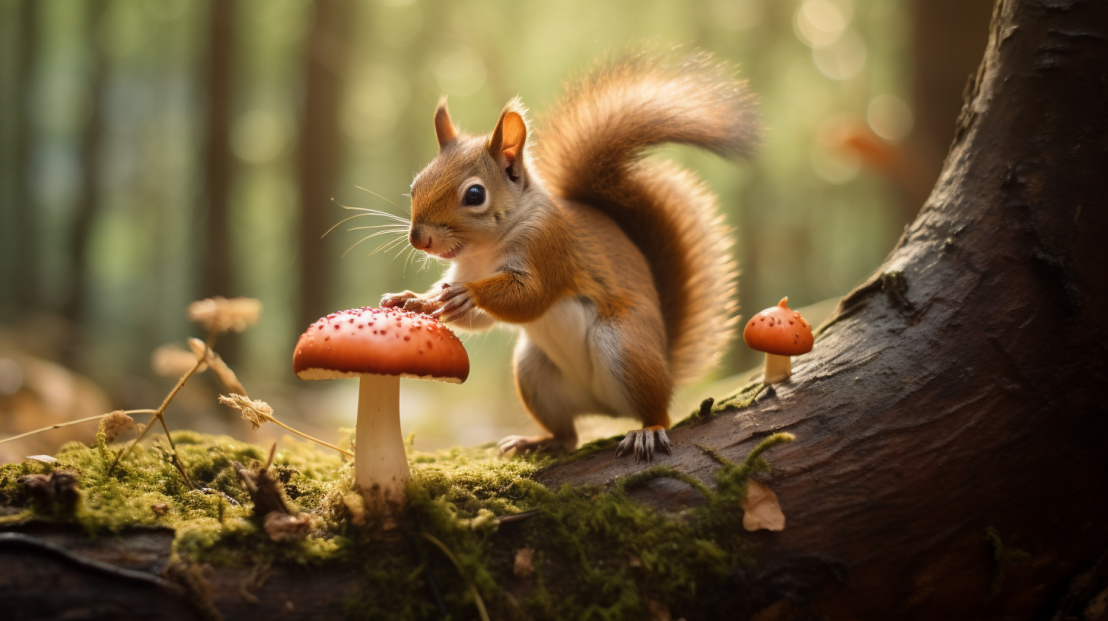As you amble through the sun-dappled forest, a sudden flurry of activity catches your eye. There, hopping with unparalleled agility, is one of nature’s most endearing gymnasts: the squirrel. These bushy-tailed creatures are a common sight, living their lives in a bustling cycle of gathering and feasting. But have you ever wondered what exactly makes up the diet of these curious animals? Specifically, have you ever paused mid-walk, a half-bitten sandwich in hand, to ponder, do squirrels eat mushrooms?
The answer might surprise you! Squirrels, with their omnivorous inclinations, are certainly known to partake in a fungal feast. Mushrooms do make an appearance on their eclectic menu, but there’s so much more to uncover about what these adorable creatures eat and how they interact with the natural buffet around them.
The Dietary Habits of Squirrels
Before we dive into the specifics of squirrels and their fungal foraging, let’s understand their general dietary preferences.
Overview of What Squirrels Typically Eat
Squirrels are not picky eaters. These resourceful creatures will munch on a variety of foods depending on what’s available. Their diet consists of:
- Nuts and seeds: The classic image of a squirrel nibbling on an acorn is well rooted in reality.
- Fruits and berries: Sweet and nutritious, these are a squirrel’s delight.
- Vegetables: They won’t hesitate to raid your vegetable garden for a quick snack.
- Insects: Protein-packed and often abundant, insects are a valuable food source.
How Their Diet Varies With Seasons and Habitat
H2: How Their Diet Varies With Seasons and Habitat
The seasons dictate the availability of certain foods, prompting squirrels to adapt:
- Spring: Young leaves, buds, and the occasional unguarded bird egg may find its way into a squirrel’s diet.
- Summer: This is a bounty of fruits, seeds, and insects.
- Fall: The time to stock up on nuts and seeds for the winter larder.
- Winter: Squirrels rely on their cached food and might dig up those stored treasures or seek out hearty tree bark.
Now, let’s focus on the role of mushrooms in this diverse diet plan.
Mushrooms in a Squirrel’s Diet
To answer the central question, yes, squirrels do eat mushrooms, but it’s important to understand how mushrooms fit into the grand tapestry of their daily scavenging.
Do Squirrels Eat Mushrooms? Exploring the Truth.
Squirrels have been observed gathering and munching on mushrooms in the wild. Fascinatingly, these little gatherers also exhibit behavior akin to a mycologist.
Types of Mushrooms Squirrels Are Likely to Consume
Typically, squirrels aren’t fussy about the type of mushrooms they eat. From common porch mushrooms to the more elusive and exotic varieties found deep in the woods, if it’s a mushroom, there’s a chance a squirrel will give it a try.
The Role of Mushrooms in a Squirrel’s Nutritional Intake
Mushrooms provide squirrels with:
- Essential nutrients: Rich in vitamins and minerals, they are a healthy snack.
- Water content: Mushrooms can be a hydration source, especially in dry periods.
Uniquely, squirrels are known to collect mushrooms and store them for later, sometimes even hanging them in trees to dry, which is thought to be a method of preserving their food.

The Benefits and Risks of Mushrooms for Squirrels
Navigating through the fungal kingdom, squirrels inadvertently play a balancing act between nutrition and safety.
Nutritional Benefits of Mushrooms for Squirrels
Mushrooms can be a powerhouse of nutrition for squirrels, offering a range of vitamins and minerals, along with healthy doses of dietary fiber. This fungal fare might include:
- Vitamin B: Essential for energy and brain health.
- Minerals: Such as potassium, which is crucial for nerve function and muscle health.
Potential Risks and Toxic Mushrooms
Not all mushrooms are benign, however. Some species are poisonous and can pose serious risks to squirrels, as they do to humans. The intake of toxic mushrooms could lead to:
- Digestive upset
- Neurological issues
- Even fatal poisoning in severe cases
However, squirrels seem to have an innate ability to discern which mushrooms to avoid, a skill necessary for their survival in the wild.
Observing Squirrel Behavior Around Mushrooms
Observing squirrels in their natural habitat can reveal more about their relationship with mushrooms.
How to Spot Squirrels Eating Mushrooms in the Wild
To see squirrels feasting on mushrooms, it’s best to venture into the woods during the damp seasons when mushrooms are most abundant. You may find squirrels, agile and alert, nosing around the base of trees, a prime location for mushroom growth.
Squirrel Foraging Habits and Preferences
Squirrels are diligent foragers and tend to have favorite spots where food is plentiful, returning frequently to check for new growth. Their sharp memories help them locate caches of dried mushrooms they’ve stored away for leaner times.
Protecting Your Garden: Squirrels and Mushroom Cultivation
If you’re a mushroom enthusiast with a garden, you might find squirrels as enthusiastic about your produce as you are. Here are some tips to manage squirrels if you grow mushrooms:
- Use fencing: Installing a mesh barrier can help protect your mushroom beds.
- Offer alternative food sources: Distract squirrels with strategically placed feeders.
- Squirrel-proof your mushrooms: Cover beds with garden cloth or nets during peak foraging times.
Squirrels and Other Foods: A Comparison
When we compare mushrooms to other foods in a squirrel’s diet, it’s clear that nuts and seeds take precedent due to their availability and high-energy content. Still, mushrooms are a valuable food source that can provide squirrels with variety and nutrients especially when other food sources are scarce.
Explore more about squirrels and their eclectic tastes in our guides on squirrel nutrition and their potential predatory habits:
- Can Squirrels Eat Chocolate? A Guide to Squirrel Nutrition
- Do Squirrels Eat Bird Eggs? The Truth Revealed
Key Takeaways
- Squirrels do eat mushrooms and they may form an important component of their diet.
- While mushrooms offer nutritional benefits, there are risks involved with toxic varieties.
- Observing squirrels in the wild can provide insights into their foraging behaviors.
- Gardeners cultivating mushrooms can take steps to protect their crops from squirrels.
- Mushrooms are just one part of a squirrel’s varied diet.
FAQs
Do squirrels prefer certain types of mushrooms?
Squirrels aren’t particularly choosy; however, they tend to go for ones that are not toxic. They might have preferences based on availability and nutritional need, but this can vary widely between individual squirrels and their environments.
Are mushrooms a significant part of a squirrel’s diet?
Mushrooms can be a significant part of the diet, especially in seasons when mushrooms are plentiful and other food sources are less available.
How do squirrels find mushrooms?
Squirrels use their keen sense of smell and sight to locate mushrooms. They’re also known to remember locations of abundant food sources, returning to them when needed.
Can squirrels distinguish between safe and toxic mushrooms?
It appears that squirrels have an impressive ability to identify and avoid toxic mushrooms, which is a crucial skill for survival in the wild. However, not much scientific research has been conducted to fully understand this capability.
As twilight paints the woodland in resplendent hues, our foraging friends scurry along the forest floor—one with the fluttering leaves and whispering pines—masters of survival. In the tapestry of ecology, every nibble of a mushroom and crack of a nut tells a story of balance and coexistence. With bated breath, we continue to witness their fascinating saga, a testament to nature’s enduring spectacle.
Hey there, fellow nature enthusiasts! I’m Mark Gray, the passionate owner of OutdoorAnimals.com, a hub dedicated to uncovering the incredible world of outdoor animals. Whether you’re a hiker, a four-wheeler, or just someone who revels in the beauty of the great outdoors, you’re in the right place. I seek to understand all varieties of animals, from the great elk to the simple mouse, my goal is to write and share this knowledge with the public.

